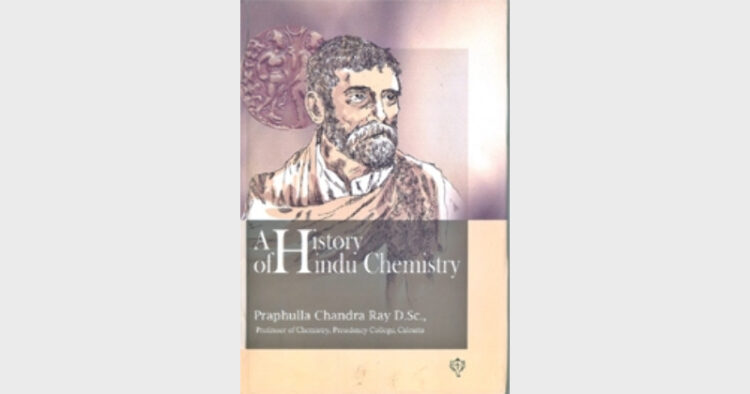| A History of Hindu Chemistry, Praphulla Chandra Ray, Kurukshethra Prakasan, Pp 280, Rs 350.00 |
Intro: Over the years, the Hindu system of medicine, called Ayurveda, methodised and arranged the knowledge rationally on the basis of scientific terminology.
In ancient times, while the West used their knowledge of chemistry to prepare medicines, conduct metallurgical operations, technical arts and transmutation of metals, India used it as a handmaiden of medicine or better still, “as an adjunct to the tantric cult.” Over the years, the Hindu system of medicine, called Ayurveda, methodised and arranged the knowledge rationally on the basis of scientific terminology. Charaka and Sushruta record scientific advances during the Vedic period, when Nyaya and Vaiseshika systems of philosophy were interwoven into the text. Charaka’s Charaka Samhita is considered as the oldest treatise on medicine proper, reflecting the spirit and progress of its age.
Sushruta makes use of numerous passages from Charaka Samhita but the former is “par excellence a treatise on surgery,” says Praphulla Chandra Ray. He regrets that attempts have been made by certain schools of European scholars to prove that medical works of the Hindus are of comparatively recent date as seen when Haas propounds that it occurred between the 10th-11th centuries AD, that the Hindus borrowed their notion of humoral pathology from the Greeks and that the origin of Indian medicine is to be looked for in the writings of Galen and Hippocrates.
He is surprised as to how the West could suggest that the very name Sushruta is derived from the Arabic word ‘Sukrat’, which is often confused with ‘Bukrat’, the Arabic corruption of Greek Hippocrates. After Charaka and Sushruta, the next medical authority held in highest esteem is Vagbhata, the author of Astanga Hridaya. Minerals and natural salts figure in his prescriptions along with vegetable drugs. This is seen in the 10th century, when Vrinda and Chakrapani propagated the use of collyrium, as inscribed on a stone pillar by Nagarjuna at Pataliputra.
The next chapter is devoted to the tantric cult and expulsion of Buddhism. Nagarjuna was the first to introduce the preparation of kajjvali (black sulphide of mercury) in alchemy. Another alchemist was Patanjali, who became more famous for writing the Panini. The author emphasises that the Eastern nations were the first to employ mercury in the “cure of obstinate, cutaneous and leprous afflictions.”
The author points out that the Arabs translated many Hindu works on medicine during Caliph Haroun’s rule. Al-Beruni, an Arab traveller, lived in India from 1017-1030 AD and mastered Sanskrit to study Hindu mathematics and philosophy in the original. He then goes on to give details on the Ayurvedic period in which emphasis was given to five gross elements or panchamahabhootas i.e. earth, water, fire, air and space which were given importance and whose imbalance led to ailments in the human body.
Details for preparation of collyrium, the rasas, the metals and the aparas during the different periods are also described. Under rasas are listed abhra (mica), vaikranta, makshika (pyrites), vimala, adrija (bitumen), sasyaka, chapala and rasaka, which when mixed with different products were processed for use in medicine. Various gems and metals are mentioned for use as tonic, as allayer of gas, phlegm and bile, as killer of all kinds of ailments and as ‘subduer’ of death.
This reviewer regrets that the book comes to an abrupt end, possibly because the author gets confused on how to conclude the topic of study.
Manju Gupta (The reviewer is former Editor of the NBT)














Comments